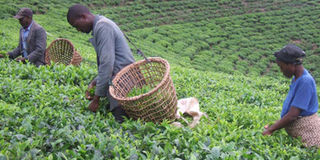Tea farmers cry out over falling tea prices

Farmers in Kyenjojo District have appealed to government to intervene following the fluctuating prices of tea leaves.
What you need to know:
No market. Tea buyers attribute the problem to excess supply.
KYENJOJO. Farmers in Kyenjojo District have appealed to government to intervene following the fluctuating prices of tea leaves.
A kilogramme of unprocessed tea now costs Shs250 down from Shs500 at farm gate price.
Some farmers in Binunda Ward, Kyarusozi Town Council said their children may not go back to school next term because of low market for the produce.
Majority of farmers in the district derive their livelihood from tea growing.
“We shall continue to buy tea leaves from farmers who only have good quality at Shs250 per kilogramme unless if the factories increase the price. This time the prices cannot go up because of high supply,” Mr January Wilson, a tea buyer, said.
Mr Wilson said the factories limit the supply due to market forces.
“We were given a limit of only 1,000-1,500 kilogrammes each transporter to supply and of which three farmers can cover those kilogrammes,” he said.
Mr Wilson said some tea factories do not have the full capacity to process the tea leaves due to lack of capital.
“It is only Mwenge Tea Factory which can consume much of the tea leaves here but it consumes its own grown tea,” Mr Wilson said.
He said farmers were not suffering when Mabale factory was still operating in its full capacity three years ago.
Mr Jonathan Sinai, the director of Kyarusozi Growers Tea Company Ltd, said starting 2020, tea leaves in Kyenjojo will be processed because they are working with government to promote the market. Mr Sinai said price fluctuation has been a major challenge in the district for the past three years.
President Museveni in 2016 said government had set interventions to improve the local tea market.
Mr Museveni said he had talked to Arab countries to buy the tea and promised the farmers that government would give them subsidies such as fertilizers.
TEA MARKET IN UGANDA
Annually, Uganda earns about $90-100 million and the crop is one of the country’s traditional exports. The industry employs more than 62,000 people, supporting more than 500,000 dependents in Uganda.
The country boasts of 16 tea processing and exporting companies operating 21 processing factories. Four of these are owned by small holders, including Igara, Kayonza, Mabale and Mpanga Growers Tea factories. Much of the tea products are the black crush tea and curl tea from tender leaves which are mostly handpicked. T
ea is largely grown along the Lake Victoria crescent, the lower slopes of the Rwenzori Mountain and above the Western Rift Valley. More than 90 per cent of Uganda’s processed and graded tea finds its way to international markets through the Mombasa Auction market where it is branded and consumed as Kenyan tea. Europe, the Middle East, Russia, and America are the export destinations for Uganda’s tea.
According to The Tea Detective, an online publication, Uganda is Africa’s third largest tea producer.Top tea exporters and tea growing countries in the world include by position as; China, India, Kenya, Sri Lanka, Vietnam, Turkey, Iran, Indonesia, Argentina, Japan, Thailand, Uganda, Bangladesh, Malawi and Burundi.




